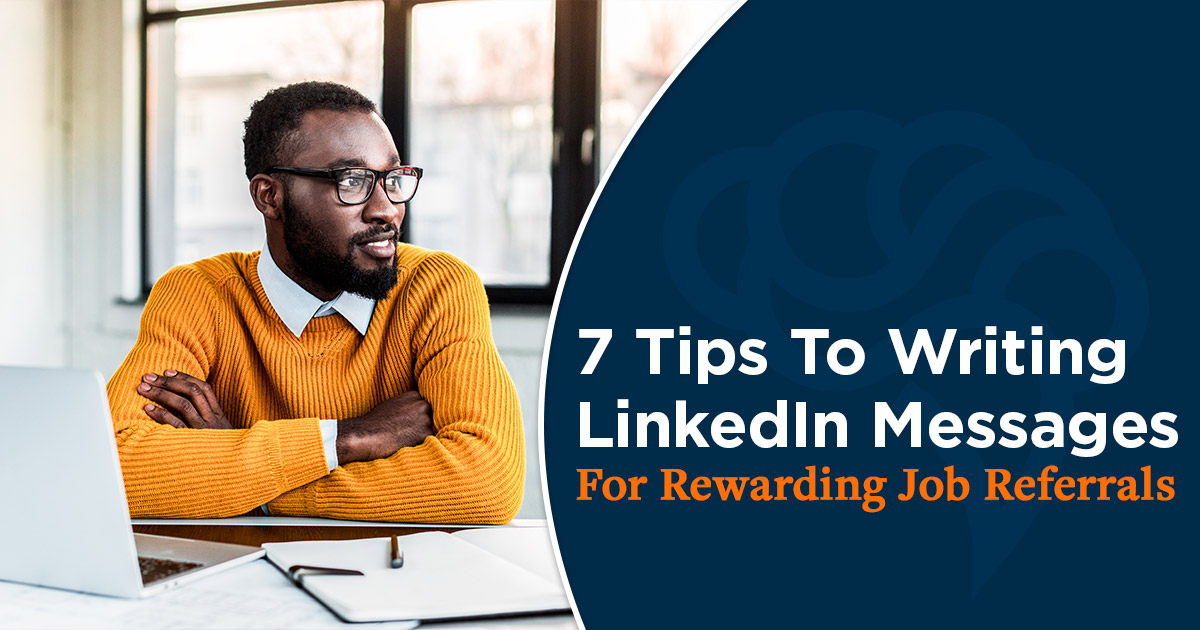7 Tips To Writing LinkedIn Messages For Rewarding Job Referrals

The year before I finished my PhD was an extremely rough year, for personal and professional reasons.
I was burning the candle on both ends.
Thankfully, I joined the Cheeky Scientist Association around that time, and the CSA was a critical support system for me — both psychologically and physically.
In the months after I defended my thesis, I dedicated the better half of my days to working my network and adding value to my connections.
I was still employed by my university, and I need to emphasize how supportive my advisor was during this phase.
I was disillusioned by the fact that I worked hard to get my resume to the hiring managers at my “dream” companies, and then I’d get rejected for a variety of reasons outside my control.
“We already have candidates onsite.”
Or…
“We decided to close the position because of budgets”.
It was frustrating.
I knew I was getting close, but it just wasn’t enough.
Meanwhile, my LinkedIn presence was growing.
And, one afternoon, I received a call from a recruiter who found me on LinkedIn.
By this time, I was already beginning to get a little jaded, but I followed up with him.
And, I am so glad I did.
Because that single follow-up catalyzed the chain of events that landed me my current position.
Reaching out and following up on LinkedIn takes effort.
But, it will be worth it.
A good LinkedIn presence (amongst other things) landed this PhD his dream job.
It is essential that you don’t underestimate the value of the people in your network, and the value of the people you interact with on LinkedIn.
People are what truly matter, and ultimately are what will help you reach your goals.
Why You Must Have A LinkedIn Networking Strategy

Referrals are the number one way to get hired.
And, LinkedIn is the largest networking platform for professionals.
According to a study conducted by LinkedIn, 70% of people were hired at a company where they had a connection.
70%!
The study also found that 35% of people reported that a casual LinkedIn conversation led to a new opportunity.
So, for more than a third of the 15,509 people in the survey, a quick note to a connection was enough to bring them a new opportunity.
That is the power of networking.
And, as a job seeker, you must know how to network.
Specifically, you must know how to network on LinkedIn.
If you do not know how to use LinkedIn, you are missing out on an enormous resource.
As reported by Fast Company, the power of LinkedIn actually goes beyond your “first connections” because most job referrals come from second and third degree connections.
These “weak connections” are where most people get job referrals.
And, not only do job referrals boost your chances at getting hired, but referrals have also been shown to increase starting salary.
A study in The Review Of Economic Studies journal found that a referral raises wages of workers in their first year at the firm by 6.7 ± 3.4%.
A 6.7% increase is substantial.
For example, having a referral can increase your starting salary from $75,000 to $80,000 per year, and that $5,000 increase also positively impacts any bonuses based on your salary, and any future raises you may receive.
LinkedIn is a fantastic resource to build your network and increase your chances of getting a referral.
But, you have to know how to network on LinkedIn successfully.
7 Tips To Writing LinkedIn Messages That Lead To Job Referrals
Referrals lead to high salary, high job satisfaction, and they increase your chance of getting hired.
But, getting a referral requires effort.
It requires you to interact with your professional network in a valuable way.
Here are 7 tips for sending networking messages that will help you build successful professional relationships and earn referrals…
1. Focus on your current network.

There is someone in your current network, right now, who can get you a job.
Stop spending the majority of your time reaching out to cold contacts, in the hope that you will find the one magical connection.
This isn’t how it works.
Instead, dig into your current network.
Reconnect with people you already know.
This can mean reaching out to a previous supervisor, or to someone who gave a talk at your university.
The effort that you invest into your current network, the people you already have some rapport with, will pay off much better than time spent reaching out to strangers.
Leverage and invest in the people you already know.
2. Allow the person to respond to you on their terms.
Don’t be presumptuous.
This means avoiding phrases such as, “Thank you in advance” or “looking forward to hearing from you”.
These phrases can make you seem pushy.
And, you don’t want that.
Don’t expect anything in return from a person that you send a networking message to.
Of course, you want this interaction to ultimately lead to a referral, but this should not be apparent in your message.
Just let the person know that you are available and give them a few ways to reach you.
Wish them well and thank them for their time, regardless of whether or not they respond to you.
3. Have a clear plan and a clear goal.
Like any strategy, when reaching out to people with networking messages, you need to have a plan and a goal.
This will help you maintain motivation and consistently move toward your larger goal of getting hired.
A good place to start is to reach out to 2 people per day.
Just 2.
This way, you can spend the time to research and send a truly personalized message to each of these connections.
It also makes keeping track of your networking manageable.
Because, a huge part of the success of your networking comes down to how you plan to keep track of your messages.
This can be done as a spreadsheet, in your calendar, or in another organizational app such as Trello, etc.
Whatever you choose, it is important that you keep track of who you contacted, when you contacted them, and what the interaction was like.
This will help you build a sustainable networking strategy.
4. Find a commonality.

When reaching out to your network — be it via LinkedIn or via email — you need to begin the interaction by finding some common ground.
You need to find a way to relate to the person you are messaging.
For a past contact, this can mean reminding them of an interaction you had in the past, and relating it to something happening in the present.
Or, you may have recently traveled to their city, or share a common hobby.
For a brand new connection you are interested in having an informational interview with, a great way to find this common ground is to mention your interest in the position that they currently have.
If you are struggling to find a commonality, find out more about this connection by reading through their LinkedIn profile, or by visiting their website if they have one.
Read about their personal and professional interests, their hobbies, where they have worked, and what projects they have worked on.
You are bound to find something that you have in common.
5. Always, always add value.
Adding value is the number one thing you must do in your networking messages.
Never begin an interaction by asking for something.
Think about it.
If someone sent you a message that said, “Hi, I’m interested in xxx position, can you help me please?”
Would you respond?
Probably not.
You are busy and this message gives you no reason to respond.
Now, what about if someone sent you this message?
“Hi, I noticed you recently published an article in xxx magazine. I wanted to let you know I really enjoyed it. What you wrote about xxx was my favorite part. Hope you have a great day.”
Would you respond?
Maybe you would respond to say thank you, but even if you didn’t respond, you would think nicely of the person who sent it to you.
These are they types of networking messages you should be sending.
Send messages that do not ask for something and that add value to the other person.
This will help you build up your rapport and when the time comes, give you the background you need to ask for a referral.
6. Send your message outside of normal business hours.
People get a lot of emails and a lot of LinkedIn messages.
During the work day, these messages might get ignored because there are other urgent things happening.
Someone may ignore your message, not because they don’t want to respond to you, but because they were busy when they saw your message and then forgot about it.
A good way around this is to send your messages outside of normal business hours.
This way, there may not be as many urgent things happening, and your message may get more attention.
There are also a lot less emails sent outside of work hours, so you are less likely to get lost in the crowd.
7. Follow up consistently.
Real networking happens in your follow-ups.
This is where you can set yourself apart from others.
Most people do not have the discipline to create a follow-up strategy and then stick to it.
But, you are a PhD.
If anyone knows how to be disciplined, and see something through to the end, it’s you.
Create a plan to follow up every 2 weeks, or every month, etc. with your connections of interest.
Send them messages that add value, that they will enjoy reading.
If you consistently follow up with someone, even if they do not respond to you, you are building rapport and trust.
They are seeing that you know how to follow through.
You are committed.
Without a solid follow-up plan, your networking strategy will fail.
So, it is essential that you make this a priority.
Networking is the foundation of your job search. Although a company may ultimately be your employer, it’s a person who is going to hire you. Making real and valuable connections with people is what will propel your job search forward. And to make that happen, you need to know how to send a proper networking message. This means focusing on your current network, allowing people to respond to you on their terms, having a clear plan and goal, finding commonality, adding value, sending your message outside normal business hours, and following up consistently. If you do these things, you will be able to build up a solid professional network that can help you make the transition from academia to industry.
If you’re ready to start your transition into industry, you can apply to book a free Transition Call with our founder Isaiah Hankel, PhD or one of our Transition Specialists. Apply to book a Transition Call here.

ABOUT SIDHARTH MOHAN, PHD
Sidharth Mohan, PhD, is a researcher with expertise in protein biochemistry and information technology. He strives to improve the quality of human life through better, more-affordable drugs and healthcare.
More Written by Sidharth Mohan, PhD































